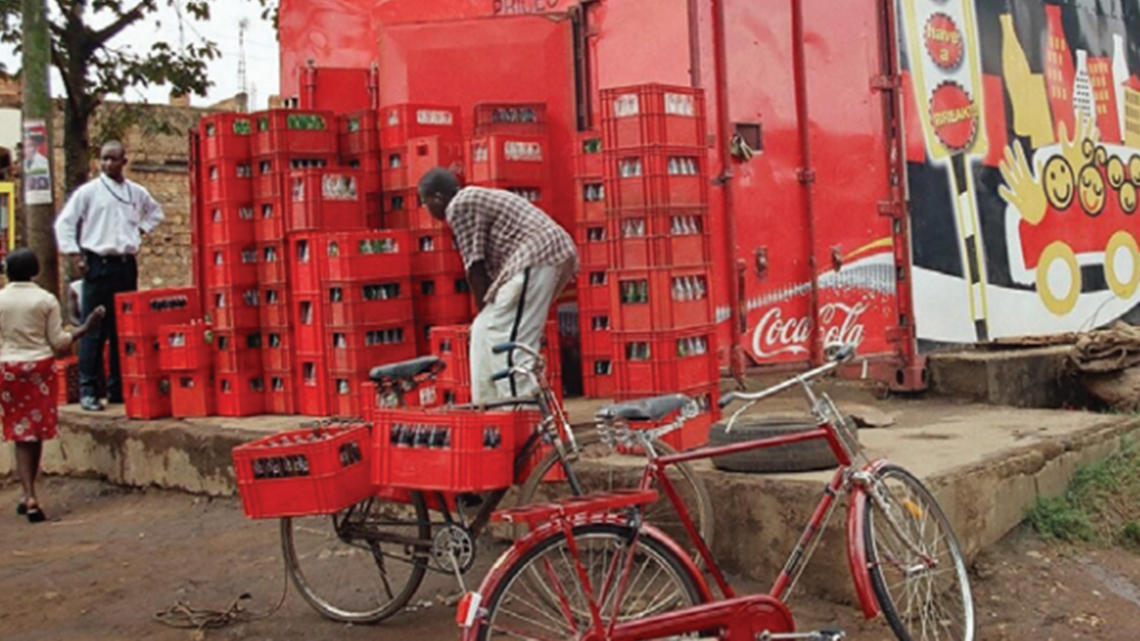Coca-Cola’s innovative approach to distribution is proving to be both good for the company and good for development as demonstrated in a recent report (Available on hks.harvard.edu) published by the company along with the CSR Initiative at the Harvard Kennedy School and the International Finance Corporation. According to the study, the company has, to date, created over 2,500 manual distribution centers (MDCs) in Africa, generating over 12,000 jobs and more than US$ 500 million in annual revenues.
Coca-Cola’s approach to distributing its products in hard-to-reach urban and peri-urbanareas in Africa identifies and engages independent entrepreneurs that distribute and sell its beverages in small, specific geographical areas. MDCs are typically located in areas where a lack of stable roads and infrastructure makes it difficult for delivery trucks to travel, which helps the company secure hard-to-reach markets while creating wealth and job growth in those communities. Those who set up MDCs employ others in the area, who then sell and distribute beverage products to retailers, often by bicycle or pushcart. The MDCs account for over 80% of the company’s sales in East Africa.
Entitled Developing Inclusive Business Models, the study, reviewed the MDC model in Dar es Salaam, Tanzania and Addis Ababa, Ethiopia as a way to discover new opportunities for scaling up the MDC model and fulfilling the company’s commitment to the Business Call to Action, an initiative that mobilizes large companies to help reach the Millennium Development Goals by harnessing core business competencies.
The research study identified a number of opportunities to further enhance the MDC approach. These include:
- Investing in continuous improvement of the core business model through improved access to finance and expanded and enhanced training;
- Broadening socio-economic opportunity for MDC owners and employees through life skills and further education opportunities;
- Promoting small business development and entrepreneurship more widely by supporting entrepreneurship education and advocacy for small enterprise development;
- Exploring how the business model could distribute social products or messages;
- Undertaking participatory evaluation and action-based learning.
As part of the study launch, Muhtar Kent, Chairman and CEO of The Coca – Cola Company, William J. Clinton, 42nd President of the United States and Founding Chairman, Clinton Global Initiative, and Pat Woertz, Chairman of the Board of Directors, CEO and President of Archer Daniels Midland Company, discussed ways business can play a role in creating value for both shareholders and society during a panel discussion at the Brookings Institution on 13 May.
“For Coca-Cola, the MDCs are a wonderful example of the way business can focus on meeting its consumers’ and customers’ needs while supporting the sustainability of communities,” said Muhtar Kent. “It has long been our philosophy to look at our business system holistically and determine where we can have the greatest impact on advancing initiatives that are critical to the communities and stakeholders that we rely on.”
According to Jane Nelson of the Harvard Kennedy School, “There is a growing recognition in the corporate and international development communities that the most sustainable contribution companies can make to poverty alleviation is to carry out their core business activities in a profitable, responsible and inclusive manner.” AndIFCDirector Toshiya Masuoka argues that the study “demonstrates the potential of large corporations to build economically viable business linkages with small enterprises in their value chains, which can also have development benefits.”
Coca-Cola is currently in discussion with potential development partners to assist in pursuing some of these opportunities to further strengthen the model. The company’s goal is to double the program and its impact by 2010.
Download the case study Developing Inclusive Business Models – A Review of Coca-Cola’s Manual Distribution Centers in Ethiopia and Tanzania (Available on hks.harvard.edu)


